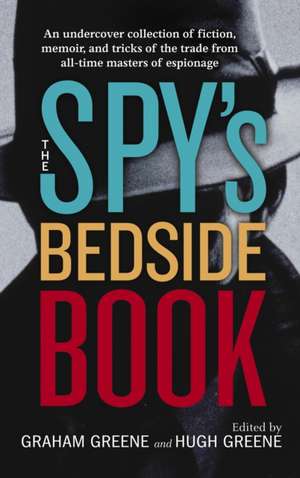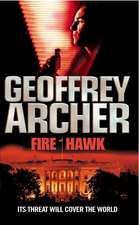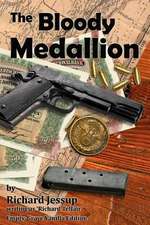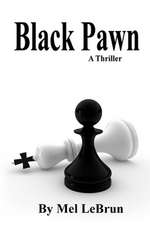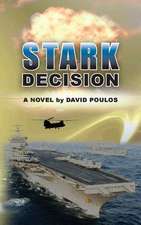The Spy's Bedside Book
Autor Hugh Greene, Graham Greeneen Limba Engleză Paperback – 31 iul 2008
Want to know how to hide a map of an enemy fort in a butterfly sketch? Wonder why James Bond himself advises always drinking vodka with pepper?
Who hasn’t fantasized about being a secret agent or been captivated by the mysterious lore of spycraft? From the words of William Blake, D. H. Lawrence, and Thomas Mann—all suspected of spying in three great wars—to classic espionage stories by Joseph Conrad, Rudyard Kipling, Eric Ambler, Ian Fleming, and Graham Greene himself, this fascinating compendium of all things spy makes the perfect companion for the armchair agent in all of us. If this book divulged any more secrets, it would’ve had to be written with invisible ink. (Find out how to make your own inside!)
Preț: 69.70 lei
Nou
Puncte Express: 105
Preț estimativ în valută:
13.34€ • 13.78$ • 11.10£
13.34€ • 13.78$ • 11.10£
Carte indisponibilă temporar
Doresc să fiu notificat când acest titlu va fi disponibil:
Se trimite...
Preluare comenzi: 021 569.72.76
Specificații
ISBN-13: 9780553385908
ISBN-10: 0553385909
Pagini: 251
Dimensiuni: 134 x 209 x 15 mm
Greutate: 0.28 kg
Editura: Bantam
ISBN-10: 0553385909
Pagini: 251
Dimensiuni: 134 x 209 x 15 mm
Greutate: 0.28 kg
Editura: Bantam
Notă biografică
Graham Greene was born in 1904. While at Balliol College, Oxford, he published his first book of verse. He continues to write throughout his lifetime, and is the author of The Third Man, Our Man in Havana, The Quiet American, and The End of the Affair, in addition to many other novels, short story collections, plays, essays, travel books, and film scripts. During World War II he served with the British Secret Intelligence Service. He died in 1991.
Hugh Greene was born in 1910. He came to prominence as a journalist when he was made a chief correspondent in Nazi Berlin. During World War II he served in the RAF. Greene went on to join the BBC and was made Director-General in 1960. He died in 1987.
Hugh Greene was born in 1910. He came to prominence as a journalist when he was made a chief correspondent in Nazi Berlin. During World War II he served in the RAF. Greene went on to join the BBC and was made Director-General in 1960. He died in 1987.
Extras
1. A Mission is Proposed
I had just finished breakfast and was filling my pipe when I got Bullivant's telegram. It was at Furling, the big country house in Hampshire where I had come to convalesce after Loos, and Sandy, who was in the same case, was hunting for the marmalade. I flung him the flimsy with the blue strip pasted down on it, and he whistled.
"Hullo, Dick, you've got the battalion. Or maybe it's a staff billet. You'll be a blighted brass-hat, coming it heavy over the hard-working regimental officer. And to think of the language you've wasted on brass-hats in your time!"
I sat and thought for a bit, for that name "Bullivant" carried me back eighteen months to the hot summer before the war. I had not seen the man since, though I had read about him in the papers. For more than a year I had been a busy battalion officer, with no other thought than to hammer a lot of raw stuff into good soldiers. I had succeeded pretty well, and there was no prouder man on earth than Richard Hannay when he took his Lennox Highlanders over the parapets on that glorious and bloody 25th day of September. Loos was no picnic, and we had had some ugly bits of scrapping before that, but the worst bit of the campaign I had seen was a tea-party to the show I had been in with Bullivant before the war started.
The sight of his name on a telegram form seemed to change all my outlook on life. I had been hoping for the command of the battalion, and looking forward to being in at the finish with Brother Boche. But this message jerked my thoughts on to a new road. There might be other things in the war than straightforward fighting. Why on earth should the Foreign Office want to see an obscure Major of the New Army and want to see him in double-quick time?
"I'm going up to town by the ten train," I announced; "I'll be back in time for dinner."
"Try my tailor," said Sandy. "He's got a very nice taste in red tabs. You can use my name."
An idea struck me. "You're pretty well all right now. If I wire for you, will you pack your own kit and mine and join me?"
"Right-o! I'll accept a job on your staff if they give you a corps. If so be as you come down tonight, be a good chap and bring a barrel of oysters from Sweeting's."
I traveled up to London in a regular November drizzle, which cleared up about Wimbledon to watery sunshine. I never could stand London during the war. It seemed to have lost its bearings and broken out into all manner of badges and uniforms which did not fit in with my notion of it. One felt the war more in its streets than in the field, or rather one felt the confusion of war without feeling the purpose. I dare say it was all right; but since August 1914 I never spent a day in town without coming home depressed to my boots.
I took a taxi and drove straight to the Foreign Office. Sir Walter did not keep me waiting long. But when his secretary took me to his room I would not have recognised the man I had known eighteen months before.
His big frame seemed to have dropped flesh and there was a stoop in the square shoulders. His face had lost its rosiness and was red in patches, like that of a man who gets too little fresh air. His hair was much greyer and very thin about the temples, and there were lines of overwork below the eyes. But the eyes were the same as before, keen and kindly and shrewd, and there was no change in the firm set of the jaw.
"We must on no account be disturbed for the next hour," he told his secretary. When the young man had gone he went across to both doors and turned the keys in them.
"Well, Major Hannay," he said, flinging himself into a chair beside the fire. "How do you like soldiering?"
"Right enough," I said, "though this isn't just the kind of war I would have picked myself. It's a comfortless, bloody business. But we've got the measure of the old Boche now, and it's dogged as does it. I count on getting back to the Front in a week or two."
"Will you get the battalion?" he asked. He seemed to have followed my doings pretty closely.
"I believe I've a good chance. I'm not in this show for honour and glory, though. I want to do the best I can, but I wish to Heaven it was over. All I think of is coming out of it with a whole skin."
He laughed. "You do yourself an injustice. What about the forward observation post at the Lone Tree? You forgot about the whole skin then."
I felt myself getting red. "That was all rot," I said, "and I can't think who told you about it. I hated the job, but I had to do it to prevent my subalterns going to glory. They were a lot of fire-eating young lunatics. If I had sent one of them he'd have gone on his knees to Providence and asked for trouble."
Sir Walter was still grinning.
"I'm not questioning your caution. You have the rudiments of it, or our friends of the Black Stone would have gathered you in at our last merry meeting. I would question it as little as your courage. What exercises my mind is whether it is best employed in the trenches."
"Is the War Office dissatisfied with me?" I asked sharply.
"They are profoundly satisfied. They propose to give you command of your battalion. Presently, if you escape a stray bullet, you will no doubt be a Brigadier. It is a wonderful war for youth and brains. But . . . I take it you are in this business to serve your country, Hannay?"
"I reckon I am," I said. "I am certainly not in it for my health."
He looked at my leg, where the doctors had dug out the shrapnel fragments, and smiled quizzically. "Pretty fit again?" he asked.
"Tough as a sjambok. I thrive on the racket and eat and sleep like a schoolboy."
He got up and stood with his back to the fire, his eyes staring abstractedly out of the window at the wintry park.
"It is a great game, and you are the man for it, no doubt. But there are others who can play it, for soldiering today asks for the average rather than the exception in human nature. It is like a big machine where the parts are standardised. You are fighting, not because you are short of a job, but because you want to help England. How if you could help her better than by commanding a battalion—or a brigade—or, if it comes to that, a division? How if there is a thing which you alone can do? Not some embusque business in an office, but a thing compared to which your fight at Loos was a Sunday-school picnic. You are not afraid of danger? Well, in this job you would not be fighting with an army around you, but alone. You are fond of tackling difficulties? Well, I can give you a task which will try all your powers. Have you anything to say?"
My heart was beginning to thump uncomfortably. Sir Walter was not the man to pitch a case too high.
"I am a soldier," I said, "and under orders."
"True; but what I am about to propose does not come by any conceivable stretch within the scope of a soldier's duties. I shall perfectly understand if you decline. You will be acting as I should act myself—as any sane man would. I would not press you for worlds. If you wish it, I will not even make the proposal, but let you go here and now, and wish you good luck with your battalion. I do not wish to perplex a good soldier with impossible decisions."
This piqued me and put me on my mettle.
"I am not going to run away before the guns fire. Let me hear what you propose."
Sir Walter crossed to a cabinet, unlocked it with a key from his chain, and took a piece of paper from a drawer. It looked like an ordinary half-sheet of notepaper.
"I take it," he said, "that your travels have not extended to the East."
"No," I said, "barring a shooting trip in East Africa."
"Have you by any chance been following the present campaign there?"
"I've read the newspapers pretty regularly since I went to hospital. I've got some pals in the Mesopotamia show, and of course I'm keen to know what is going to happen at Gallipoli and Salonika. I gather that Egypt is pretty safe."
"If you will give me your attention for ten minutes I will supplement your newspaper reading."
Sir Walter lay back in an armchair and spoke to the ceiling. It was the best story, the clearest and the fullest, I had ever got of any bit of the war. He told me just how and why and when Turkey had left the rails. I heard about her grievances over our seizure of her ironclads, of the mischief the coming of the Goeben had wrought, of Enver and his precious Committee and the way they had got a cinch on the old Turk. When he had spoken for a bit, he began to question me.
"You are an intelligent fellow, and you will ask how a Polish adventurer, meaning Enver, and a collection of Jews and gypsies should have got control of a proud race. The ordinary man will tell you that it was German organisation backed up with German money and German arms. You will enquire again how, since Turkey is primarily a religious power, Islam has played so small a part in it all. The Sheikh-ul-Islam is neglected, and though the Kaiser proclaims a Holy War and calls himself Hadji Mohammed Guilliamo, and says the Hohenzollerns are descended from the Prophet, that seems to have fallen pretty flat. The ordinary man again will answer that Islam in Turkey is becoming a back number, and that Krupp guns are the new gods. Yet—I don't know. I do not quite believe in Islam becoming a back number.
"Look at it another way," he went on. "If it were Enver and Germany alone dragging Turkey into a European war for purposes that no Turk cared a rush about, we might expect to find the regular army obedient, and Constantinople. But in the provinces, where Islam is strong, there would be trouble. Many of us counted on that. But we have been disappointed. The Syrian army is as fanatical as the hordes of the Mahdi. The Senussi have taken a hand in the game. The Persian Moslems are threatening trouble. There is a dry wind blowing through the East, and the parched grasses wait the spark. And the wind is blowing towards the Indian border. Whence comes that wind, think you?"
Sir Walter had lowered his voice and was speaking very slow and distinct. I could hear the rain dripping from the eaves of the window, and far off the hoot of taxis in Whitehall.
"Have you an explanation, Hannay?" he asked again.
"It looks as if Islam had a bigger hand in the thing than we thought," I said. "I fancy religion is the only thing to knit up such a scattered empire."
"You are right," he said. "You must be right. We have laughed at the Holy War, the Jehad that old Von der Goltz prophesied. But I believe that stupid old man with the big spectacles was right. There is a Jehad preparing. The question is, how?"
"I'm hanged if I know," I said; "but I'll bet it won't be done by a pack of stout German officers in Pickelhaubes. I fancy you can't manufacture Holy Wars out of Krupp guns alone and a few staff officers and a battle-cruiser with her boilers burst."
"Agreed. They are not fools, however much we try to persuade ourselves of the contrary. But supposing they had got some tremendous sacred sanction—some holy thing, some book or gospel or some new prophet from the desert, something which would cast over the whole ugly mechanism of German war the glamour of the old torrential raids which crumpled the Byzantine Empire and shook the walls of Vienna? Islam is a fighting creed, and the mullah still stands in the pulpit with the Koran in one hand and a drawn sword in the other. Supposing there is some Ark of the Covenant which will madden the remotest Moslem peasant with dreams of Paradise? What then, my friend?"
"Then there will be hell let loose in those parts pretty soon."
"Hell which may spread. Beyond Persia, remember, lies India."
"You keep to suppositions. How much do you know?" I asked.
"Very little, except the fact. But the fact is beyond dispute. I have reports from agents everywhere—pedlars in South Russia, Afghan horse-dealers, Turcoman merchants, pilgrims on the road to Mecca, sheikhs in North Africa, sailors on the Black Sea coasters, sheep-skinned Mongols, Hindu fakirs, Greek traders in the Gulf, as well as respectable Consuls who use cyphers. They tell the same story. The East is waiting for a revelation. It has been promised one. Some star—man, prophecy, or trinket—is coming out of the West. The Germans know, and that is the card with which they are going to astonish the world."
"And the mission you spoke of for me is to go and find out?"
He nodded gravely. "That is the crazy and impossible mission." "Tell me one thing, Sir Walter," I said. "I know it is the fashion in this country if a man has special knowledge to set him to some job exactly the opposite. I know all about Damaraland, but instead of being put on Botha's staff, as I applied to be, I was kept in Hampshire mud till the campaign in German South West Africa was over. I know a man who could pass as an Arab, but do you think they would send him to the East? They left him in my battalion—a lucky thing for me, for he saved my life at Loos. I know the fashion, but isn't this just carrying it a bit too far? There must be thousands of men who have spent years in the East and talk any language. They're the fellows for this job. I never saw a Turk in my life except a chap who did wrestling turns in a show at Kimberley. You've picked about the most useless man on earth."
I had just finished breakfast and was filling my pipe when I got Bullivant's telegram. It was at Furling, the big country house in Hampshire where I had come to convalesce after Loos, and Sandy, who was in the same case, was hunting for the marmalade. I flung him the flimsy with the blue strip pasted down on it, and he whistled.
"Hullo, Dick, you've got the battalion. Or maybe it's a staff billet. You'll be a blighted brass-hat, coming it heavy over the hard-working regimental officer. And to think of the language you've wasted on brass-hats in your time!"
I sat and thought for a bit, for that name "Bullivant" carried me back eighteen months to the hot summer before the war. I had not seen the man since, though I had read about him in the papers. For more than a year I had been a busy battalion officer, with no other thought than to hammer a lot of raw stuff into good soldiers. I had succeeded pretty well, and there was no prouder man on earth than Richard Hannay when he took his Lennox Highlanders over the parapets on that glorious and bloody 25th day of September. Loos was no picnic, and we had had some ugly bits of scrapping before that, but the worst bit of the campaign I had seen was a tea-party to the show I had been in with Bullivant before the war started.
The sight of his name on a telegram form seemed to change all my outlook on life. I had been hoping for the command of the battalion, and looking forward to being in at the finish with Brother Boche. But this message jerked my thoughts on to a new road. There might be other things in the war than straightforward fighting. Why on earth should the Foreign Office want to see an obscure Major of the New Army and want to see him in double-quick time?
"I'm going up to town by the ten train," I announced; "I'll be back in time for dinner."
"Try my tailor," said Sandy. "He's got a very nice taste in red tabs. You can use my name."
An idea struck me. "You're pretty well all right now. If I wire for you, will you pack your own kit and mine and join me?"
"Right-o! I'll accept a job on your staff if they give you a corps. If so be as you come down tonight, be a good chap and bring a barrel of oysters from Sweeting's."
I traveled up to London in a regular November drizzle, which cleared up about Wimbledon to watery sunshine. I never could stand London during the war. It seemed to have lost its bearings and broken out into all manner of badges and uniforms which did not fit in with my notion of it. One felt the war more in its streets than in the field, or rather one felt the confusion of war without feeling the purpose. I dare say it was all right; but since August 1914 I never spent a day in town without coming home depressed to my boots.
I took a taxi and drove straight to the Foreign Office. Sir Walter did not keep me waiting long. But when his secretary took me to his room I would not have recognised the man I had known eighteen months before.
His big frame seemed to have dropped flesh and there was a stoop in the square shoulders. His face had lost its rosiness and was red in patches, like that of a man who gets too little fresh air. His hair was much greyer and very thin about the temples, and there were lines of overwork below the eyes. But the eyes were the same as before, keen and kindly and shrewd, and there was no change in the firm set of the jaw.
"We must on no account be disturbed for the next hour," he told his secretary. When the young man had gone he went across to both doors and turned the keys in them.
"Well, Major Hannay," he said, flinging himself into a chair beside the fire. "How do you like soldiering?"
"Right enough," I said, "though this isn't just the kind of war I would have picked myself. It's a comfortless, bloody business. But we've got the measure of the old Boche now, and it's dogged as does it. I count on getting back to the Front in a week or two."
"Will you get the battalion?" he asked. He seemed to have followed my doings pretty closely.
"I believe I've a good chance. I'm not in this show for honour and glory, though. I want to do the best I can, but I wish to Heaven it was over. All I think of is coming out of it with a whole skin."
He laughed. "You do yourself an injustice. What about the forward observation post at the Lone Tree? You forgot about the whole skin then."
I felt myself getting red. "That was all rot," I said, "and I can't think who told you about it. I hated the job, but I had to do it to prevent my subalterns going to glory. They were a lot of fire-eating young lunatics. If I had sent one of them he'd have gone on his knees to Providence and asked for trouble."
Sir Walter was still grinning.
"I'm not questioning your caution. You have the rudiments of it, or our friends of the Black Stone would have gathered you in at our last merry meeting. I would question it as little as your courage. What exercises my mind is whether it is best employed in the trenches."
"Is the War Office dissatisfied with me?" I asked sharply.
"They are profoundly satisfied. They propose to give you command of your battalion. Presently, if you escape a stray bullet, you will no doubt be a Brigadier. It is a wonderful war for youth and brains. But . . . I take it you are in this business to serve your country, Hannay?"
"I reckon I am," I said. "I am certainly not in it for my health."
He looked at my leg, where the doctors had dug out the shrapnel fragments, and smiled quizzically. "Pretty fit again?" he asked.
"Tough as a sjambok. I thrive on the racket and eat and sleep like a schoolboy."
He got up and stood with his back to the fire, his eyes staring abstractedly out of the window at the wintry park.
"It is a great game, and you are the man for it, no doubt. But there are others who can play it, for soldiering today asks for the average rather than the exception in human nature. It is like a big machine where the parts are standardised. You are fighting, not because you are short of a job, but because you want to help England. How if you could help her better than by commanding a battalion—or a brigade—or, if it comes to that, a division? How if there is a thing which you alone can do? Not some embusque business in an office, but a thing compared to which your fight at Loos was a Sunday-school picnic. You are not afraid of danger? Well, in this job you would not be fighting with an army around you, but alone. You are fond of tackling difficulties? Well, I can give you a task which will try all your powers. Have you anything to say?"
My heart was beginning to thump uncomfortably. Sir Walter was not the man to pitch a case too high.
"I am a soldier," I said, "and under orders."
"True; but what I am about to propose does not come by any conceivable stretch within the scope of a soldier's duties. I shall perfectly understand if you decline. You will be acting as I should act myself—as any sane man would. I would not press you for worlds. If you wish it, I will not even make the proposal, but let you go here and now, and wish you good luck with your battalion. I do not wish to perplex a good soldier with impossible decisions."
This piqued me and put me on my mettle.
"I am not going to run away before the guns fire. Let me hear what you propose."
Sir Walter crossed to a cabinet, unlocked it with a key from his chain, and took a piece of paper from a drawer. It looked like an ordinary half-sheet of notepaper.
"I take it," he said, "that your travels have not extended to the East."
"No," I said, "barring a shooting trip in East Africa."
"Have you by any chance been following the present campaign there?"
"I've read the newspapers pretty regularly since I went to hospital. I've got some pals in the Mesopotamia show, and of course I'm keen to know what is going to happen at Gallipoli and Salonika. I gather that Egypt is pretty safe."
"If you will give me your attention for ten minutes I will supplement your newspaper reading."
Sir Walter lay back in an armchair and spoke to the ceiling. It was the best story, the clearest and the fullest, I had ever got of any bit of the war. He told me just how and why and when Turkey had left the rails. I heard about her grievances over our seizure of her ironclads, of the mischief the coming of the Goeben had wrought, of Enver and his precious Committee and the way they had got a cinch on the old Turk. When he had spoken for a bit, he began to question me.
"You are an intelligent fellow, and you will ask how a Polish adventurer, meaning Enver, and a collection of Jews and gypsies should have got control of a proud race. The ordinary man will tell you that it was German organisation backed up with German money and German arms. You will enquire again how, since Turkey is primarily a religious power, Islam has played so small a part in it all. The Sheikh-ul-Islam is neglected, and though the Kaiser proclaims a Holy War and calls himself Hadji Mohammed Guilliamo, and says the Hohenzollerns are descended from the Prophet, that seems to have fallen pretty flat. The ordinary man again will answer that Islam in Turkey is becoming a back number, and that Krupp guns are the new gods. Yet—I don't know. I do not quite believe in Islam becoming a back number.
"Look at it another way," he went on. "If it were Enver and Germany alone dragging Turkey into a European war for purposes that no Turk cared a rush about, we might expect to find the regular army obedient, and Constantinople. But in the provinces, where Islam is strong, there would be trouble. Many of us counted on that. But we have been disappointed. The Syrian army is as fanatical as the hordes of the Mahdi. The Senussi have taken a hand in the game. The Persian Moslems are threatening trouble. There is a dry wind blowing through the East, and the parched grasses wait the spark. And the wind is blowing towards the Indian border. Whence comes that wind, think you?"
Sir Walter had lowered his voice and was speaking very slow and distinct. I could hear the rain dripping from the eaves of the window, and far off the hoot of taxis in Whitehall.
"Have you an explanation, Hannay?" he asked again.
"It looks as if Islam had a bigger hand in the thing than we thought," I said. "I fancy religion is the only thing to knit up such a scattered empire."
"You are right," he said. "You must be right. We have laughed at the Holy War, the Jehad that old Von der Goltz prophesied. But I believe that stupid old man with the big spectacles was right. There is a Jehad preparing. The question is, how?"
"I'm hanged if I know," I said; "but I'll bet it won't be done by a pack of stout German officers in Pickelhaubes. I fancy you can't manufacture Holy Wars out of Krupp guns alone and a few staff officers and a battle-cruiser with her boilers burst."
"Agreed. They are not fools, however much we try to persuade ourselves of the contrary. But supposing they had got some tremendous sacred sanction—some holy thing, some book or gospel or some new prophet from the desert, something which would cast over the whole ugly mechanism of German war the glamour of the old torrential raids which crumpled the Byzantine Empire and shook the walls of Vienna? Islam is a fighting creed, and the mullah still stands in the pulpit with the Koran in one hand and a drawn sword in the other. Supposing there is some Ark of the Covenant which will madden the remotest Moslem peasant with dreams of Paradise? What then, my friend?"
"Then there will be hell let loose in those parts pretty soon."
"Hell which may spread. Beyond Persia, remember, lies India."
"You keep to suppositions. How much do you know?" I asked.
"Very little, except the fact. But the fact is beyond dispute. I have reports from agents everywhere—pedlars in South Russia, Afghan horse-dealers, Turcoman merchants, pilgrims on the road to Mecca, sheikhs in North Africa, sailors on the Black Sea coasters, sheep-skinned Mongols, Hindu fakirs, Greek traders in the Gulf, as well as respectable Consuls who use cyphers. They tell the same story. The East is waiting for a revelation. It has been promised one. Some star—man, prophecy, or trinket—is coming out of the West. The Germans know, and that is the card with which they are going to astonish the world."
"And the mission you spoke of for me is to go and find out?"
He nodded gravely. "That is the crazy and impossible mission." "Tell me one thing, Sir Walter," I said. "I know it is the fashion in this country if a man has special knowledge to set him to some job exactly the opposite. I know all about Damaraland, but instead of being put on Botha's staff, as I applied to be, I was kept in Hampshire mud till the campaign in German South West Africa was over. I know a man who could pass as an Arab, but do you think they would send him to the East? They left him in my battalion—a lucky thing for me, for he saved my life at Loos. I know the fashion, but isn't this just carrying it a bit too far? There must be thousands of men who have spent years in the East and talk any language. They're the fellows for this job. I never saw a Turk in my life except a chap who did wrestling turns in a show at Kimberley. You've picked about the most useless man on earth."
Recenzii
“A charming curiosity….[The Spy's Bedside Book] serves not simply as a companion to espionage fiction, but as a kind of spy's how-to, right down to tips on secreting messages in boiled eggs and how to disguise maps in diagrams of butterfly wings (thanks to Sir Robert Baden-Powell, who actually did that).”—Los Angeles Times
“This compendium of memoir, fiction, aphorism and historical accounts of espionage through the centuries is the literary equivalent of a triple agent at a dead drop: You never know what you'll get, but it's always intriguing.”–News & Observer, Raleigh“
Many of the early masters of spy fiction—from John Buchan to Ian Fleming—are represented in this quirky anthology, along with surprise guests, including W.H. Auden and Colette.”—Wall Street Journal
“This compendium of memoir, fiction, aphorism and historical accounts of espionage through the centuries is the literary equivalent of a triple agent at a dead drop: You never know what you'll get, but it's always intriguing.”–News & Observer, Raleigh“
Many of the early masters of spy fiction—from John Buchan to Ian Fleming—are represented in this quirky anthology, along with surprise guests, including W.H. Auden and Colette.”—Wall Street Journal
Descriere
In this irresistible collection of stories, excerpts, and trivia, readers experience not only the most exciting missions ever penned but some of the best short fiction ever written in the genre.
